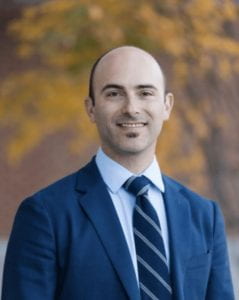Funded by a generous endowment from an anonymous donor, the Personalized Treatments for Cystic Fibrosis Cluster (CF Cluster) is one of 10 interdisciplinary academic groups formed as part of Dartmouth College President Phil Hanlon’s goal of strengthening academic excellence at Dartmouth. The cluster initiative is aimed at extending Dartmouth’s impact on the world through interdisciplinary faculty teams who collaborate at the leading edge of discovery. Through the initiative of Dr. Bruce Stanton and other Dartmouth faculty the CF Cluster was envisioned to comprise a group of three investigators that would strengthen and expand the excellent translational research and training in CF at the institution.
 James Bliska, PhD joined the Geisel School of Medicine at Dartmouth as a Distinguished Professor in Microbiology and Immunology and senior lead faculty member of the CF Cluster in 2018. His research is focused on understanding how bacterial toxins interact with the immune system to trigger pathogenesis or host protection. In the CF Cluster Dr. Bliska is studying opportunistic bacterial pathogens (e.g. Burkholderia) that produce toxins and cause infections in the lungs of CF patients. He is also exploring the use of synthetic immunology to combat bacterial lung infections in CF patients. Contact: James Bliska
James Bliska, PhD joined the Geisel School of Medicine at Dartmouth as a Distinguished Professor in Microbiology and Immunology and senior lead faculty member of the CF Cluster in 2018. His research is focused on understanding how bacterial toxins interact with the immune system to trigger pathogenesis or host protection. In the CF Cluster Dr. Bliska is studying opportunistic bacterial pathogens (e.g. Burkholderia) that produce toxins and cause infections in the lungs of CF patients. He is also exploring the use of synthetic immunology to combat bacterial lung infections in CF patients. Contact: James Bliska
 Benjamin Ross, PhD joined the CF Cluster faculty in 2019, as an Assistant Professor of Microbiology and Immunology in the Geisel School of Medicine at Dartmouth. His research is focused on understanding the factors that determine the makeup of the bacteria resident in the human gastrointestinal tract (the gut microbiota). These bacteria influence diverse aspects of human health, including immunity. In the CF Cluster, Dr. Ross is working to understand why the abundance of certain healthy bacteria (Bacteroides) is depleted in individuals with CF, and how altered Bacteroides levels impact CFTR function in the gut. His goal is to improve health in CF through restoration of Bacteroidesor tailored probiotic bacteria. Contact: Benjamin Ross
Benjamin Ross, PhD joined the CF Cluster faculty in 2019, as an Assistant Professor of Microbiology and Immunology in the Geisel School of Medicine at Dartmouth. His research is focused on understanding the factors that determine the makeup of the bacteria resident in the human gastrointestinal tract (the gut microbiota). These bacteria influence diverse aspects of human health, including immunity. In the CF Cluster, Dr. Ross is working to understand why the abundance of certain healthy bacteria (Bacteroides) is depleted in individuals with CF, and how altered Bacteroides levels impact CFTR function in the gut. His goal is to improve health in CF through restoration of Bacteroidesor tailored probiotic bacteria. Contact: Benjamin Ross
Planning for the third CF Cluster position is underway. The endowed CF Cluster is a major demonstration of institutional commitment to CF research at Dartmouth that aided in the renewals of the DartCF P30 and the CF Foundation Research Development Program awards. The hires of Dr. Bliska and Dr. Ross added important dimensions to the existing CF research at Dartmouth in areas of immunology, Burkholderia pathogenesis, gastrointestinal microbiome, and bioinformatics. Total CF research funding at Dartmouth has increased substantially since the cluster was established. Key CF
Cluster research accomplishments include:
- Development of CF mouse models at Dartmouth to facilitate pre-clinical research studies.
- Established the first mouse model of cepacia syndrome that recapitulates the severe disease seen in CF patients.
- Initiation of a large-scale biobank of intestinal microbiota samples from CF patients in collaboration with the DartCF-funded Translational Research Core to study differences in Bacteroides in the CF population and develop strategies for clinical intervention.
